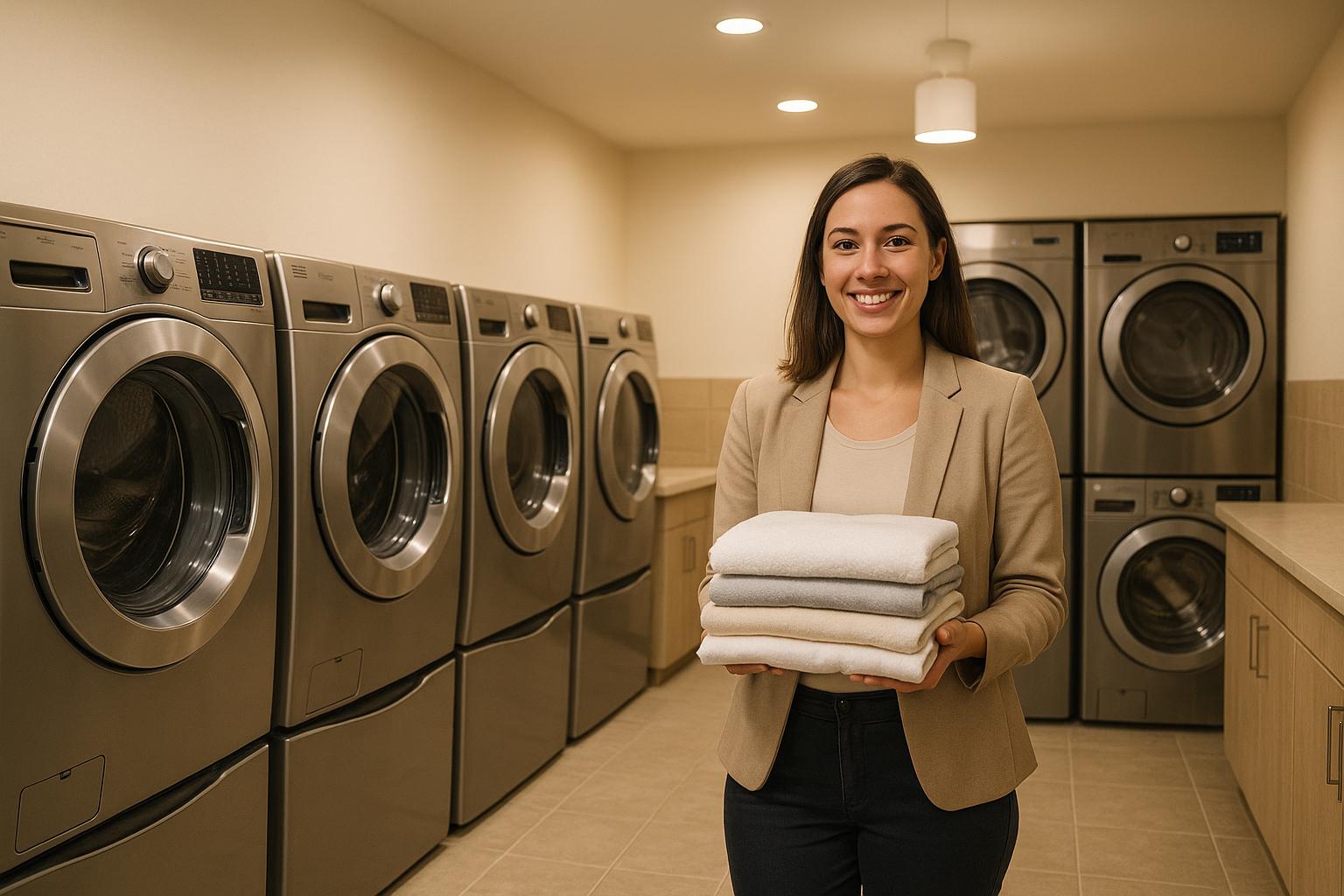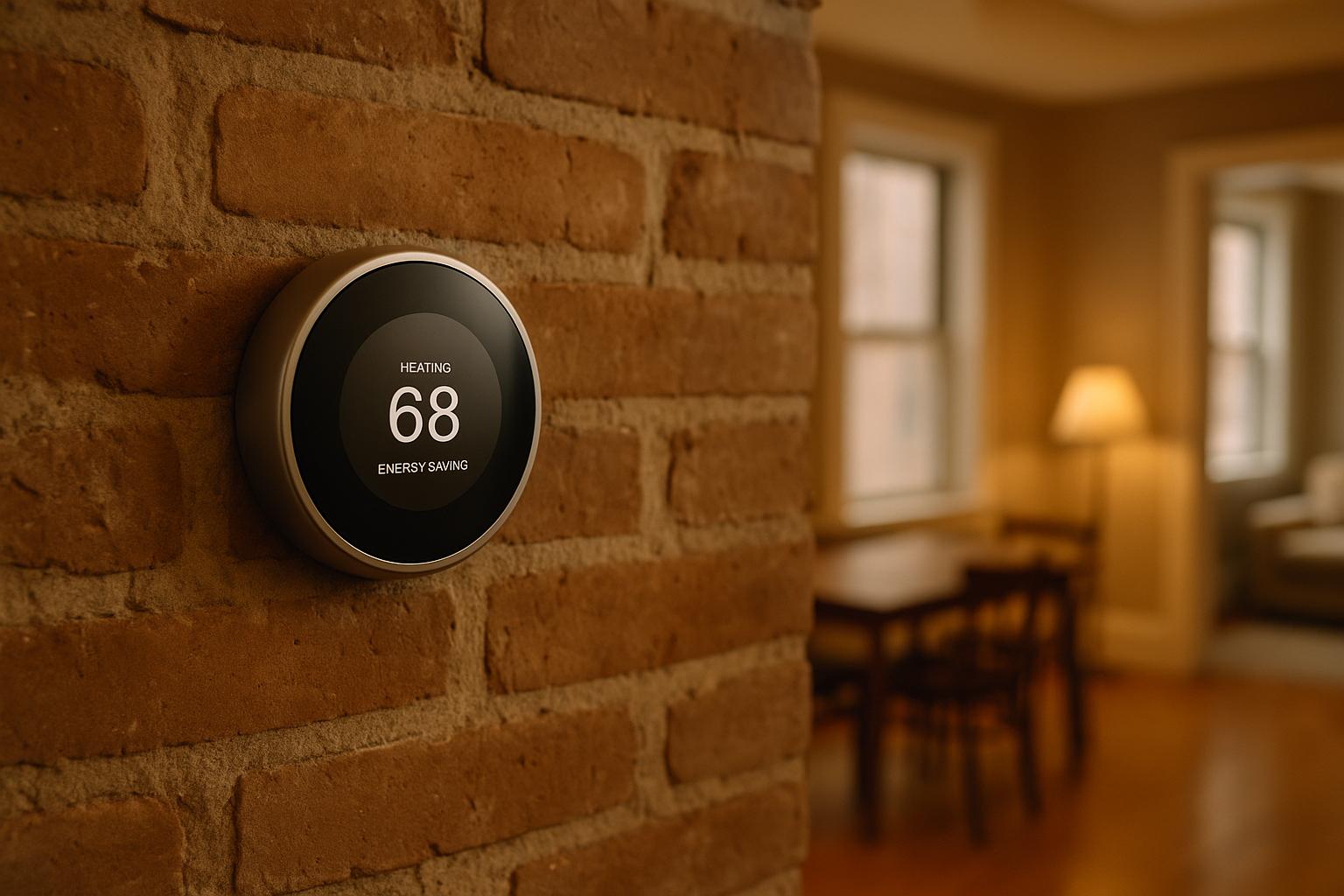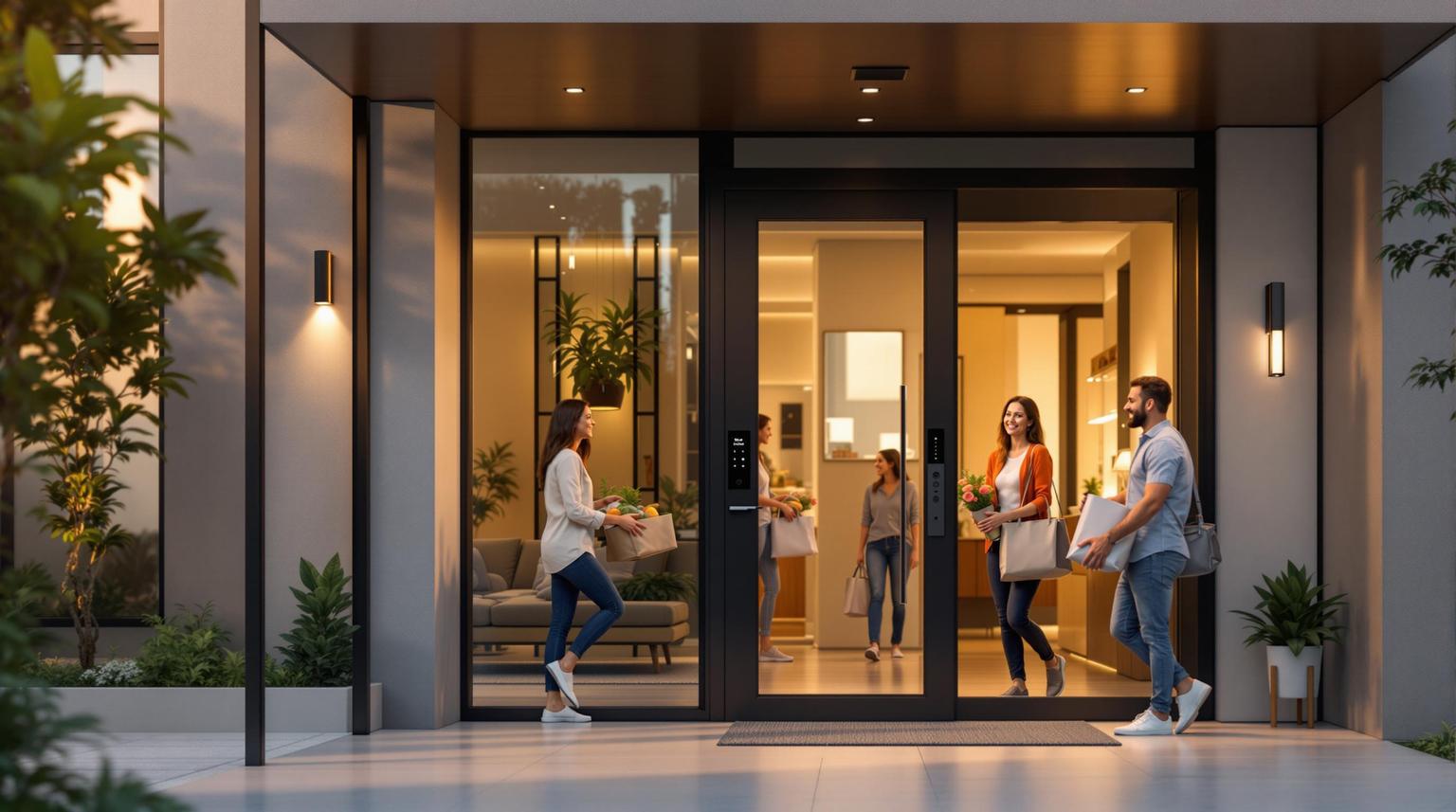Managing multifamily properties can be overwhelming, especially for large portfolios. Leasing software simplifies tasks like tenant communication, lease tracking, and financial reporting. After reviewing five top platforms - Funnel Leasing, Knock CRM, LeaseHawk, Anyone Home, and RentCafe - here’s what you need to know:
- Funnel Leasing: Centralizes renter management with tools like AI-driven virtual leasing agents and cross-property leasing capabilities. Great for reducing duplicate work and improving lead engagement.
- Knock CRM: Focuses on automating leasing tasks, scheduling tours, and managing communication. Known for its user-friendly interface and boosting prospect-to-lease conversions.
- LeaseHawk: Uses AI to handle calls, chats, and leasing inquiries 24/7. Ideal for properties with high inquiry volumes.
- Anyone Home: Offers a CRM with multichannel connectivity and AI tools for matching renters with units. Includes a 24/7 contact center for support.
- RentCafe: Integrates with Yardi systems, providing listing syndication, AI chat tools, and resident services like online rent payments.
Quick Comparison
| Platform | Key Features | Best For | Potential Drawbacks |
|---|---|---|---|
| Funnel | AI tools, centralized leasing, cross-selling | Large portfolios needing streamlined management | Limited features for broader property tasks |
| Knock CRM | Tour scheduling, lead tracking, automation | Improving conversions and communication | Occasional integration issues |
| LeaseHawk | 24/7 AI assistant, call handling | High inquiry volumes | Higher costs for additional services |
| Anyone Home | AI-driven CRM, 24/7 contact center | Matching renters to units efficiently | Setup may require technical expertise |
| RentCafe | Yardi integration, AI chat, listing tools | Properties using Yardi systems | Limited flexibility for non-Yardi users |
Each platform offers unique strengths, so the best choice depends on your portfolio size, budget, and specific needs. For example, Funnel Leasing is excellent for reducing manual work across properties, while Knock CRM excels at improving conversion rates.
Key Takeaways:
- Larger Portfolios: Look for platforms with enterprise-level tools like reporting and accounting (e.g., Funnel Leasing).
- Mid-Sized Properties: Consider user-friendly CRMs with automation features (e.g., Knock CRM or LeaseHawk).
- Integration Needs: RentCafe is ideal if you already use Yardi systems.
- AI and Automation: LeaseHawk and Anyone Home stand out for advanced AI tools.
Choose a platform that aligns with your property’s goals and ensures smooth tenant experiences.
6 of the Best Apartment Management Software Solutions
1. Funnel Leasing
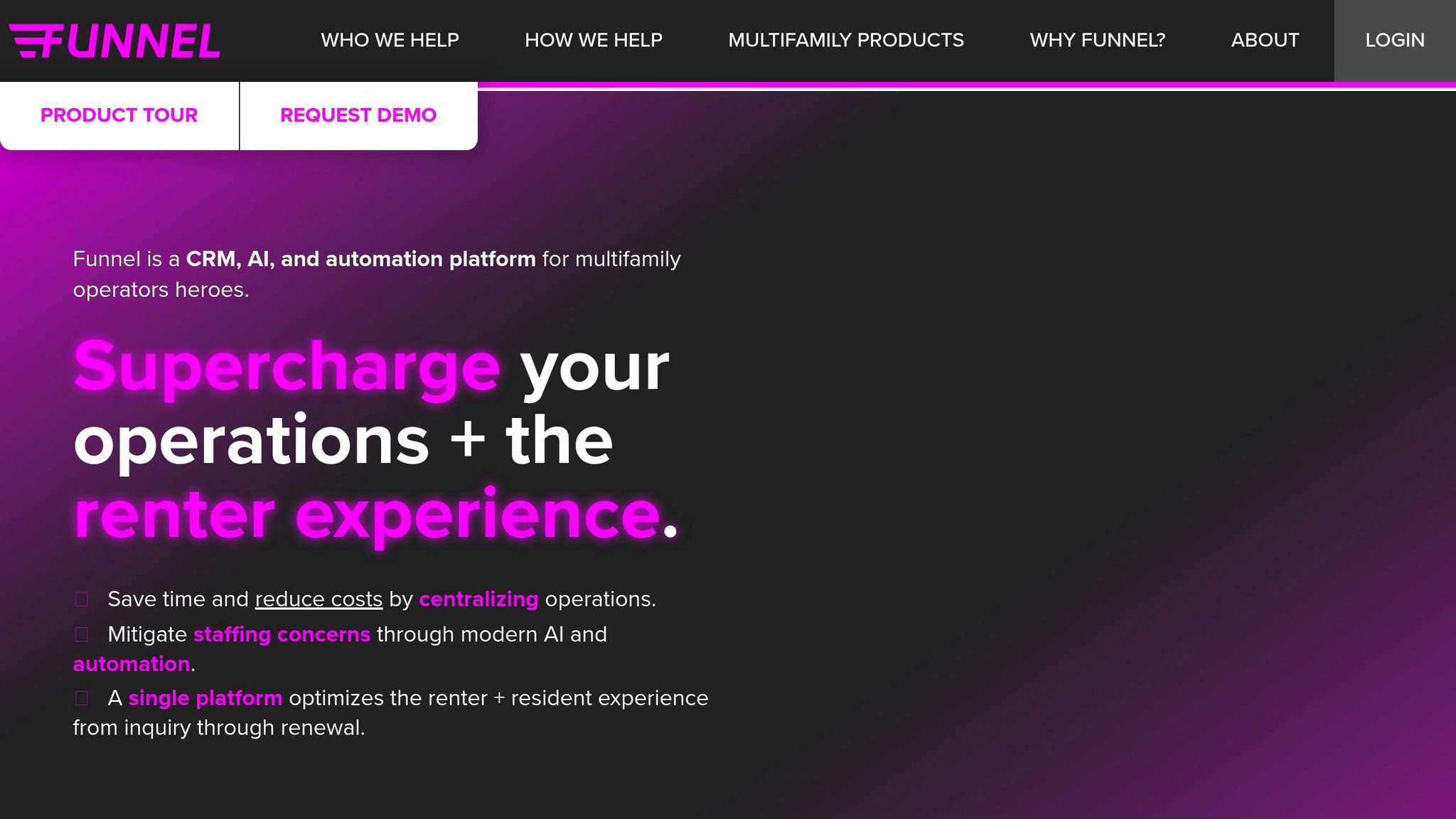
Funnel Leasing is a platform that combines CRM, AI, and automation tools, tailored specifically for multifamily operators. Its goal? To simplify operations, optimize staffing, and improve the renter experience. Let’s take a closer look at what it offers.
Features
At the heart of Funnel Leasing is its Renter Management Software (RMS). This system consolidates all renter interactions into a single, secure platform. Key components include:
- Multifamily CRM: Centralized management of leasing activities.
- Virtual Leasing Agent (VLA): Automates lead nurturing and leasing tasks.
- Online Leasing Tools: Simplifies the leasing process for renters and agents.
- Syndication Features: Expands listing visibility across platforms.
One standout feature is its centralized leasing model, allowing team members to manage leasing tasks for multiple properties, regardless of location. This approach not only encourages role specialization but also creates opportunities for cross-selling. For instance, Essex Property Trust reported an 800 basis point improvement in cross-selling efforts [3].
The platform also includes tools like My Queue, which helps prioritize daily tasks, and reporting features that deliver actionable insights. These insights can be integrated into broader business intelligence systems. Properties using Funnel’s automated follow-ups have seen a 30% boost in lead engagement, while those with 24/7 chat support experienced a 40% increase in lead capture rates [5].
"When a property that was using Funnel was shopped, the VLA [Virtual Leasing Assistant] scored 100 percent, hitting every lead nurturing requirement we have", said Joya Pavesi, EVP of Marketing and Strategy [2].
Pricing
Funnel Leasing doesn’t publish standard pricing. Instead, it customizes costs based on the size of the portfolio and the specific features a client needs.
Integration Capabilities
Funnel is designed to work seamlessly with a variety of property management systems (PMS), AI tools, and communication platforms, making it highly adaptable. Some of its integration partners include:
- Yardi Voyager and RentCafe
- RealPage OneSite
- BetterBot and Elise AI
- Gmail
- YieldStar
- SmartRent
These integrations ensure real-time syncing of data, enhancing operational efficiency.
"Camden uses Funnel as its complete leasing platform. We leverage it as a CRM with marketing automation and a virtual leasing agent. It integrates nicely with our property management software", shared Kristy Simonette, SVP of Strategic Services [4].
Support Options
Funnel offers support through multiple channels, including email, chat, and phone. Its support team is structured across tiers to address various technical needs, and the company is actively working toward providing 24/7 support. Tools like Salesforce Service Cloud and Jira are used for managing tickets, while a dedicated incident response team handles technical issues.
"Funnel offers me the peace of mind that all prospects and residents alike have timely access to our team no matter what the day's agenda holds", said Victoria Lewandowski, Leasing & Marketing Manager [3].
Performance Highlights
Funnel’s impact is evident in the results reported by its clients:
- Camden Property Trust saved $4 million annually.
- Essex Property Trust reduced task time by 35%.
- RMR Group increased resident retention by 15% year-over-year [3][4][6].
These outcomes underline how Funnel Leasing helps multifamily operators streamline their operations while delivering measurable results.
2. Knock CRM
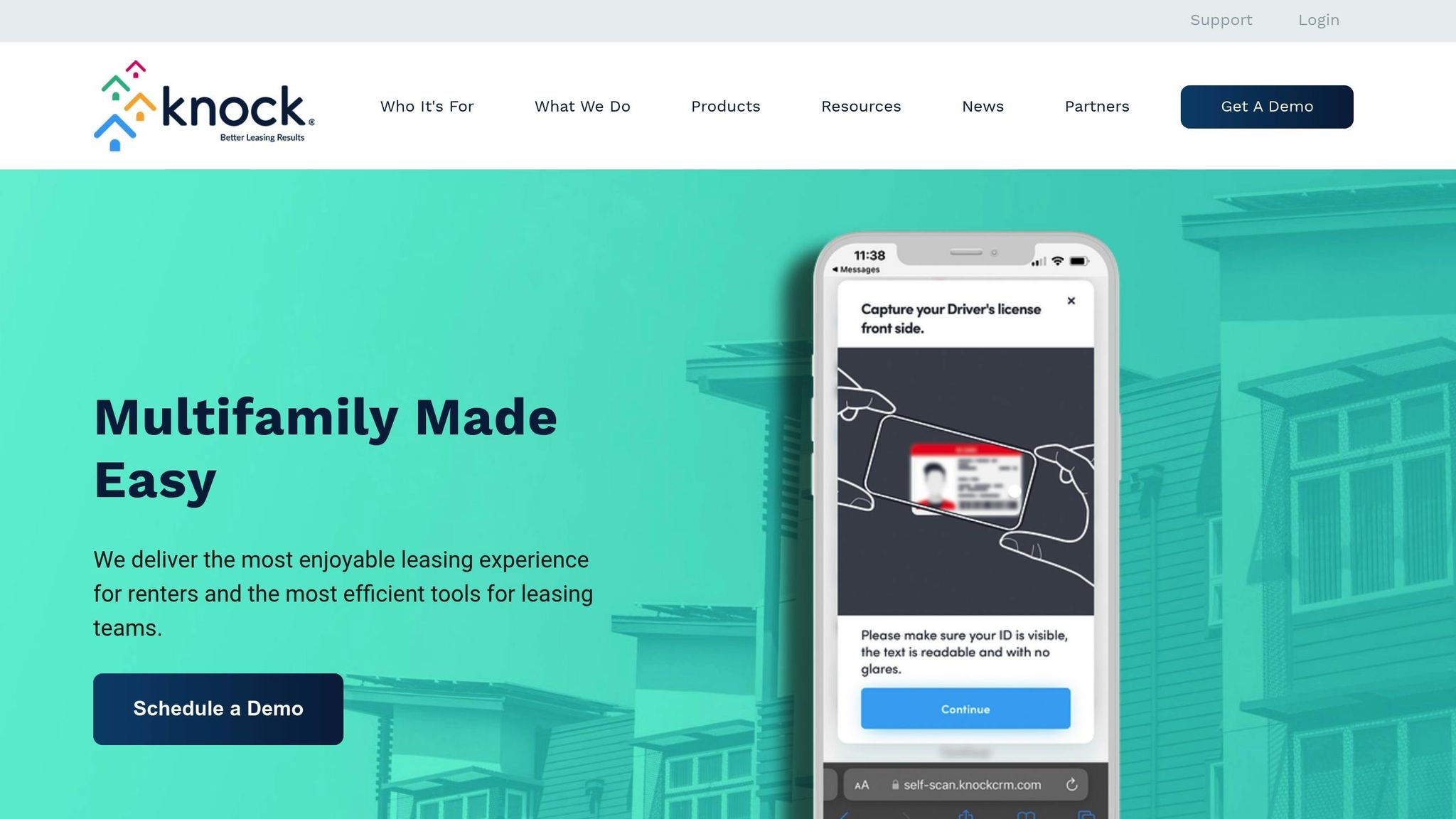
Knock CRM is designed to simplify leasing operations for marketing, leasing, and operations teams working with large multifamily properties. Its tools aim to boost efficiency, improve NOI, and make the leasing process smoother.
Features
Knock CRM takes inspiration from Funnel Leasing's integrated approach, offering automation and communication tools tailored for property management. This includes features for scheduling apartment tours, marketing properties, managing leasing tasks, and overseeing team performance.
One standout feature is Knock Now™, which lets prospective renters self-schedule tours directly through websites or apps. This tool has been shown to increase tour volume by 2.5x without requiring additional marketing spend [7][8]. The platform also supports marketing teams with source attribution data and automated campaigns to monitor and improve performance.
The messaging tools centralize communication across email, text, voice, and chat, all accessible from one dashboard. Meanwhile, the Centralized Leasing Suite helps agents retain leads within their portfolio, creating more leasing opportunities [9].
Knockbot, an AI-powered chatbot, enhances lead quality [9][11], while Knock Mobile keeps leasing teams connected on the go [7][8]. Task management tools include a gamified leasing experience to boost productivity, along with benchmarking and performance tracking to give teams a clear view of their activity. Strategic planning tools provide actionable insights for corporate teams and onsite managers.
Marketing teams can also benefit from the Ad Spend report, which has helped some customers reduce marketing costs by up to 7% [9]. For instance, Flournoy Companies leveraged this feature to refine their marketing strategy, achieving a 4% drop in response times and a 9% increase in prospect-to-visit rates [9].
Pricing
Knock CRM does not display standard pricing on its website. Costs are tailored based on the size of a portfolio and the specific features required.
Integration Capabilities
Knock CRM integrates seamlessly with Property Management Systems (PMS), ensuring a smooth user experience [12]. Its partnership APIs and PMS integrations allow teams to adopt the technology they need without unnecessary IT headaches [8].
In June 2022, Knock CRM announced an integration with AppFolio Property Manager, enabling users of both platforms to access their services directly within Knock's interface [12]. This collaboration is part of AppFolio's AppFolio Stack™ initiative, which focuses on connecting its platform with key technology partners.
Knock CRM also features an open API that supports connections with various software solutions. Its partner directory includes tools for resident applications, automated communications, smart home technologies, and virtual tours [13][14].
Support Options
Knock CRM prides itself on hands-on support for integrations and implementation [15]. The company monitors integration health 24/7 to address issues proactively and provides user-friendly training for its clients.
For example, CARROLL Properties reported a smooth integration process and easy training experience with Knock [15]. Similarly, Aspen Square Management replaced four separate solutions with Knock, improving reporting, visibility, and cost management [15].
Client success stories highlight the platform's impact. RedPeak saw a 251% increase in answered calls and a jump in prospect-to-lease conversions from 2.7% to 7.8% within just 60 days of implementing AI Voice [10]. Scott Management achieved a 28% rise in prospect-to-visit rates and a 3% boost in responsiveness using the Voice App [9].
"Knock gives us faster response times, and helps us stay aligned with our prospects' interest and timelines", said Michelle Lazebnik, Vice President of Administrations at Wimmer Communities [7][8].
"Knock has got to be one of the best companies at customer care I've seen in my 40 years of property management", noted Lee Little, Property Management at Davis Development [7][8].
3. LeaseHawk
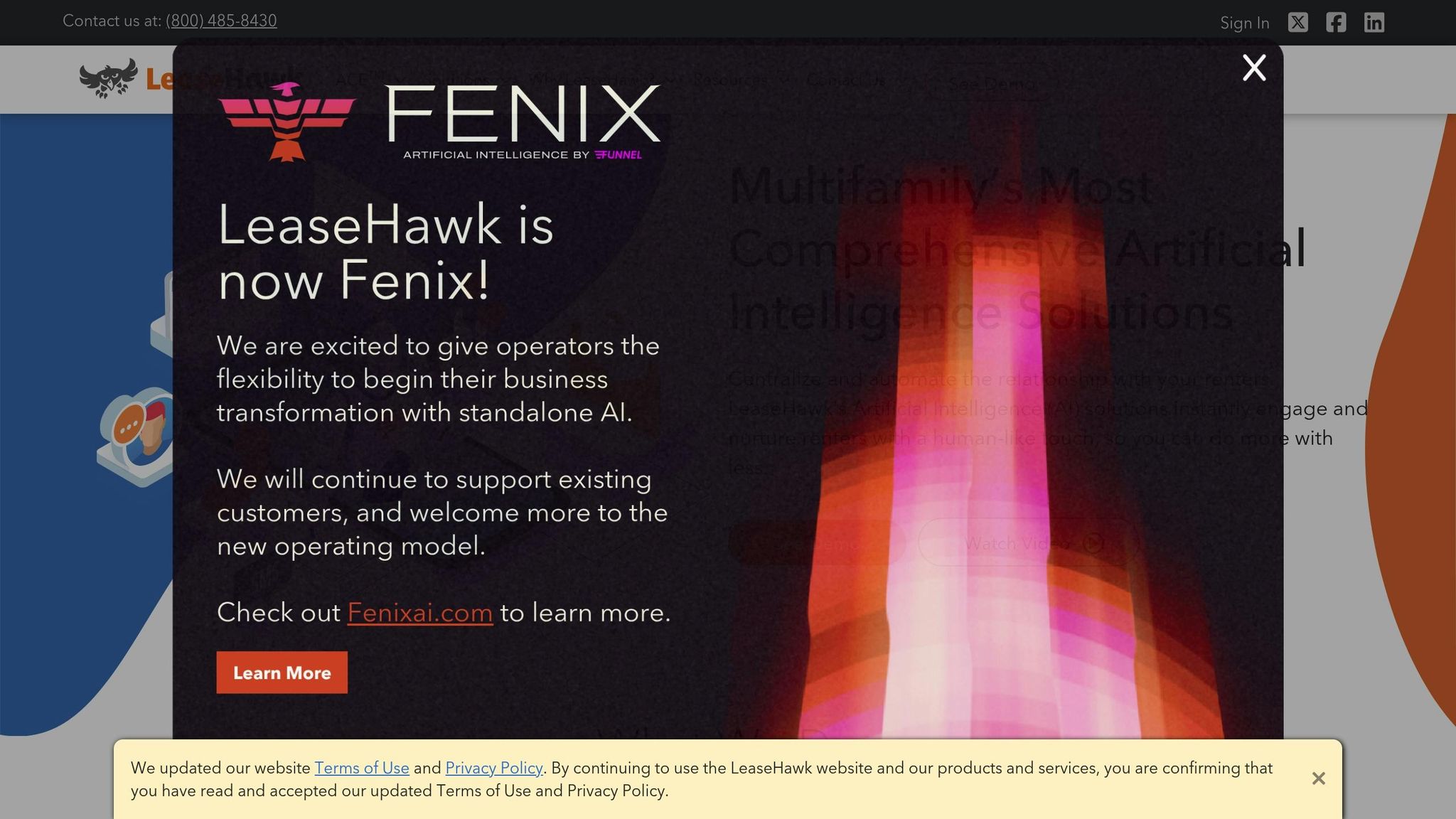
LeaseHawk streamlines the renter lifecycle for multifamily properties, tackling a major challenge in the industry: over half of leasing office calls go unanswered. With 52% of callers not trying again and nearly 70% expecting a response within 24 hours, LeaseHawk’s tools are designed to bridge this gap effectively [17].
Features
At the heart of LeaseHawk’s offerings is ACE™ (AI Virtual Assistant), a 24/7 solution that handles calls, chats, texts, and emails. ACE provides instant responses, offering real-time pricing and availability, scheduling tours, collecting guest card details, and following up with both prospects and residents [16] [18].
LeaseHawk’s Leasing Automation tools assist in qualifying leads and guiding them through the rental process. These tools sync tour scheduling with calendars and provide real-time pricing to prospects [16]. For current residents, Resident Automation acts as a concierge, managing maintenance requests, sending rent reminders, delinquency notices, and lease renewal notifications [16].
The platform also includes Conversation Insights, which transcribes and analyzes calls and voicemails to highlight renter concerns and streamline follow-ups. Meanwhile, Agent Insights evaluates leasing performance, identifies top performers, pinpoints skill gaps, and benchmarks team performance using voice biometrics [16].
LeaseHawk’s AI-driven tools have shown tangible results, such as reducing lead-to-lease time by 27% for some property management companies [18]. This is particularly impressive considering only 43% of qualified calls typically turn into appointments [17].
"Very simply, ACE adds efficiency to the leasing process while elevating prospect lead conversion. It enables properties to maximize workforce enablement - a critical objective in today's property management environment - and creates previously unforeseen flexibility in their leasing strategies." - Brock MacLean, CRO at LeaseHawk [18]
These features collectively enhance leasing efficiency and improve the customer experience.
Pricing
LeaseHawk doesn’t list standard pricing on its website. Costs are tailored based on factors like portfolio size, required features, and implementation needs.
Integration Capabilities
LeaseHawk integrates seamlessly with various property management systems, ensuring smooth data sharing and enhanced functionality [16]. For example, its CRM automatically syncs critical information with property management systems [16].
One success story is ZRS Management, which used ACE to schedule 864 tours in just 90 days, resulting in 140 leases across 11 properties [19]. ACE also integrates with tools like Knock, enabling automatic syncing of guest card and tour details [19]. Additionally, LeaseHawk works with Rent Manager, enhancing leasing operations through AI-powered solutions [20].
"With Knock and LeaseHawk's partnership, prospects are able to get answers about communities while also having the ability to self-schedule tours no matter the time of day. ACE and Knock have come together to deliver an AI leasing experience so that leasing teams prioritize the highest-quality leads through the most user-friendly workflow in the industry." - Josh Cohen, Marketing Coordinator at ZRS Management [19]
Support Options
LeaseHawk offers support via its Client Success team and technical support engineers during business hours (Monday–Friday, 8:00 AM–5:00 PM MST) [22]. Clients can submit tickets through a form or email support@leasehawk.com. The platform also includes a Support and Training Center for additional resources [21] [22]. On G2, LeaseHawk’s Quality of Support is rated 8.7 [24].
Peak Campus, a student housing company, reported significant improvements with LeaseHawk: a 35% reduction in missed calls, a 20% boost in TPA scores, and a cut in average response time from 27 hours to under 7 hours. Additionally, leasing agents reduced the time spent organizing lead information from 45 minutes to just 2 minutes per lead [23].
"LeaseHawk helped us dramatically save money, time and resources, elevating a property's customer engagement, response time and ultimately their leasing results." - Casey Peterson, Chief Operating Officer at Peak Campus [23]
This level of support is especially critical given that leasing agents often take up to 39 hours to respond to prospects, while 73% of Millennials expect a reply within a day [21].
4. Anyone Home
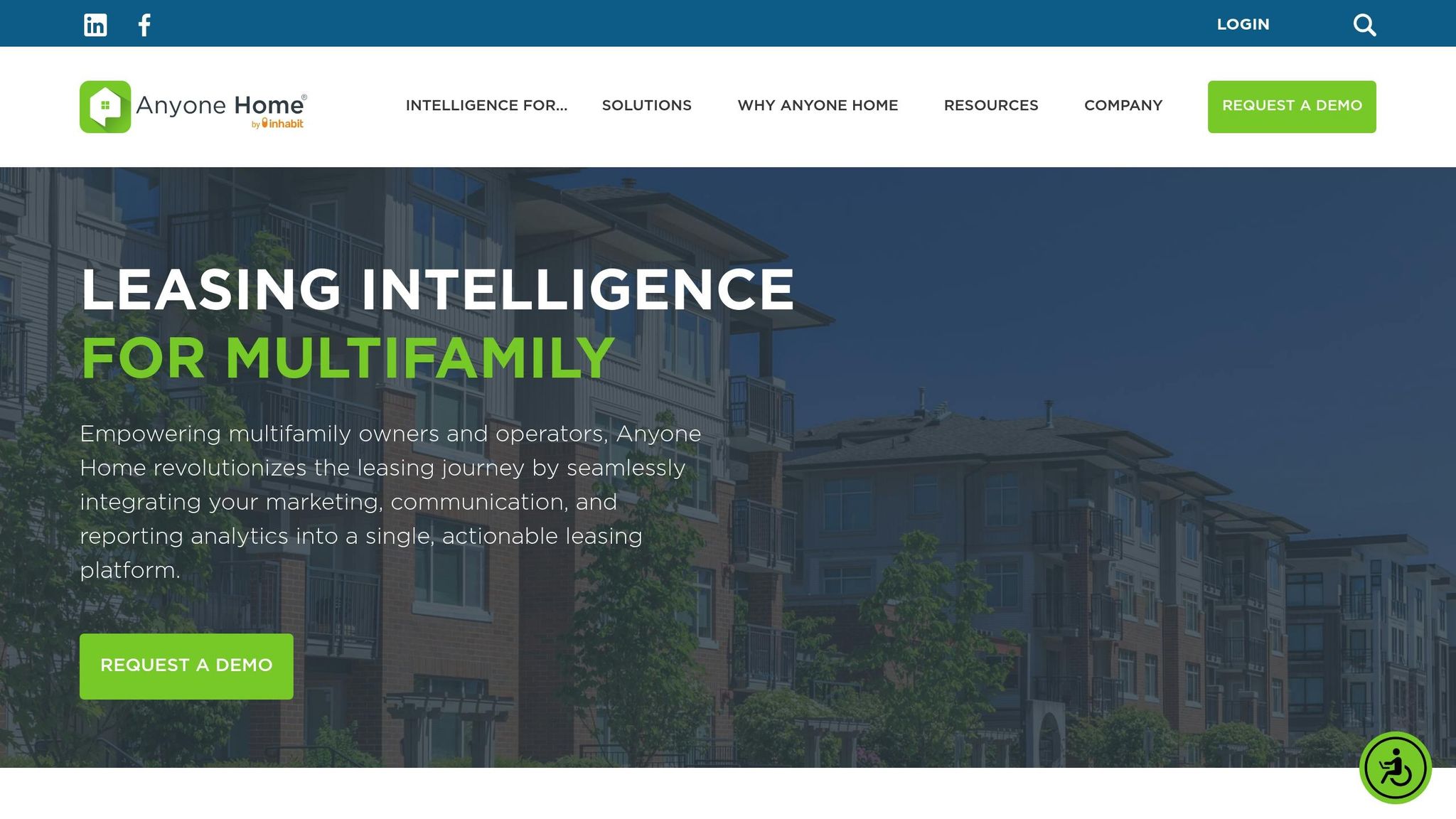
Anyone Home is a leasing intelligence platform designed for multifamily operators. It brings together marketing, communication, and analytics to simplify leasing processes and improve NOI (Net Operating Income) [25].
Features
At the heart of Anyone Home is its CRM system, which captures all communications and supports leasing teams in managing prospects. The CRM enables multichannel connectivity - covering email, chat, SMS, and outbound calls - ensuring no lead is overlooked [26].
The platform uses a FIT (Financial budget, Interested unit, Timeline) approach to match prospects with the best available units. By analyzing a prospect's budget, unit preferences, and timeline, it helps leasing teams pair prospects with suitable options seamlessly [26].
Modern marketing websites are another standout feature, offering visually engaging templates to attract prospects. The platform also includes self-guided tours and an omnichannel chatbot with live support to make communication more efficient [27] [28].
Additionally, Anyone Home provides a 24/7 contact center for phone, email, and chat support. It features leasing call analysis, offering insights such as employee call scores and detailed metrics on the leasing funnel - from marketing performance to application summaries and agent efficiency [26].
These tools integrate seamlessly into the broader technical ecosystem of the platform.
Kairoi Residential, for example, adopted Anyone Home's touring program, which includes self-guided and virtual tours supported by the CRM and centralized contact center. This approach created multiple touchpoints for prospects throughout their leasing journey.
"A comprehensive 'tour as you like' program is essential – from self-guided and virtual tours, to the support we receive from our CRM and centralized contact center, Anyone Home. Having numerous programs in place will drive the success for the season." - Kari Warren, Chief Operating Officer - Management at Kairoi Residential [25]
Integration Capabilities
Anyone Home is built to integrate smoothly with existing systems. It connects with various property management systems (PMS), pricing optimization tools, single sign-on solutions, and lead management software [29] [30].
CWS Apartment Homes utilized Anyone Home's CRM to streamline communication and achieve cost savings. The platform supports every stage of the leasing cycle - from prospecting to renewals - while maintaining clean, person-centric data architecture.
"Anyone Home supports the full lifecycle from prospect to renewal. The CRM platform consolidates communication into one easy-to-use interface for our sales professionals, while the backend person-centric architecture provides CWS Apartment Homes with the cleanest data to help uncover additional cost-savings." - Holyce Hornischer, Vice President of Marketing and Training at CWS Apartment Homes [25]
Support Options
Anyone Home's integrated approach aligns with trends in multifamily leasing by unifying communication, analytics, and engagement.
The platform prioritizes customer success through dedicated account managers who collaborate closely with clients to share best practices and optimize platform usage. The support team is known for its quick troubleshooting, thanks to direct access to product and engineering teams [31].
Gables Residential experienced this high level of support during a large-scale rollout across multiple properties, highlighting Anyone Home's focus on customer service and attention to detail.
"For such a large rollout, the attention to detail and the quality of service provided by the entire Anyone Home team was impressive. Anyone Home showcased their focus on customer service, hospitality, and prioritization of Gables as a client." - Gigi Giannoni, Vice President of Marketing & PR at Gables Residential [25]
This hands-on, collaborative support ensures smooth operations, even across large property portfolios [31].
sbb-itb-58157f8
5. RentCafe
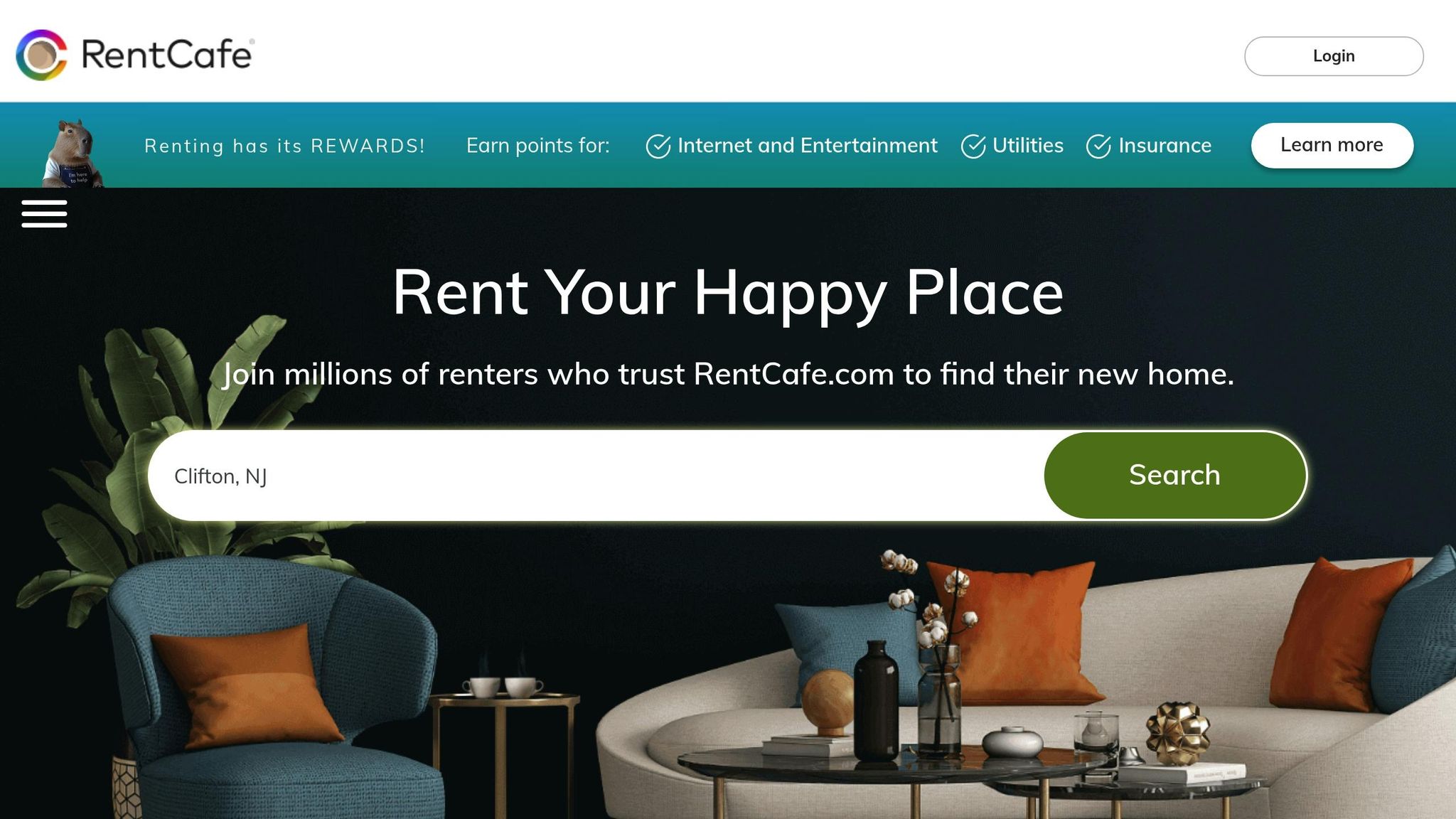
RentCafe is a property management platform designed to simplify marketing, leasing, and resident services. It offers a connected experience that streamlines the renter journey for both property staff and residents.
Features
RentCafe stands out with its listing syndication, which distributes property listings across multiple websites and portals, increasing visibility for available units. It also simplifies the leasing process with online tools that make applications easy for prospective tenants.
One of its key features, CRM IQ, provides a centralized, user-friendly dashboard that consolidates customer and property data. This tool helps leasing teams manage prospects more effectively. Arlene Delgado of Highmark Residential shared her experience:
"Our teams like being able to see everything on one, user-friendly dashboard. With CRM IQ, they have everything they need at their fingertips in one place." [32]
Another standout feature is Chat IQ, an AI-driven agent that manages chats, texts, emails, and voice interactions. It automatically answers renter inquiries and is currently deployed across over one million units [33].
The platform also supports residents with services like online rent payments, lease renewals, and maintenance requests, all accessible through a web portal or mobile app. RentCafe’s marketing tools enhance lead generation and conversion through branded websites, automated workflows, and in-depth performance analytics.
Integration Capabilities
RentCafe enhances its core offerings with seamless integration options. It works with systems like Yardi Voyager, Yardi Breeze, and Entrata, allowing property managers to streamline operations without juggling multiple platforms. Desiree Hiatt of Lund Living highlighted the efficiency this brings:
"CRM IQ has an incredibly user-friendly dashboard where our data can easily flow from one Yardi solution to another. My team sees everything they need without toggling between systems. It's a game changer!" [34]
In June 2025, Yardi partnered with Obligo to introduce a security deposit alternative within RentCafe Living. This feature gives property managers the ability to offer flexible deposit options, reducing upfront move-in costs for renters while simplifying leasing workflows [35].
Support Options
RentCafe ensures property managers have access to robust support services, including technical assistance, training programs, and dedicated implementation help. The RentCafe Site Manager allows users to oversee rental listings and account settings easily. For additional coverage, RentCafe Connect provides skilled agents trained to handle inquiries, ensuring prospects receive professional assistance even when on-site staff is unavailable.
For issues like technical glitches, account access problems, or payment concerns, RentCafe users can rely on a dedicated support team backed by Yardi Systems, Inc. This comprehensive support system helps property managers maintain smooth operations and address challenges effectively.
Advantages and Disadvantages
Each platform discussed brings its own set of strengths and challenges. Choosing the right one depends on factors like your portfolio size, budget, and specific operational needs.
Funnel Leasing stands out for its single-guest card architecture, which eliminates data silos and reduces duplicate entries. This streamlined approach minimizes manual workarounds. However, its specialized focus may not cover broader property management tasks, making it less versatile than some competitors.
Knock CRM boasts a 96% user satisfaction rating based on 17 reviews, with users praising its ease of use, improved communication, and reliable reporting. That said, it does face occasional functionality hiccups and integration issues, which may be a drawback for some users [36].
LeaseHawk shines with its professional call center services and expert lead qualification, making it effective for handling a high volume of inquiries. However, this comes with added costs, which could be a concern for properties that prefer to manage inquiries internally.
Anyone Home uses AI-powered automation to speed up response times and enhance prospect engagement. While this can be a game-changer, its success depends on proper setup and ongoing optimization, which might require technical expertise.
RentCafe integrates seamlessly with Yardi systems, ensuring smooth data flow across platforms. Its Chat IQ feature handles multiple communication channels and is already in use across more than one million units [33]. Additionally, its listing syndication boosts property visibility across various websites. On the downside, its tight integration with Yardi limits flexibility for properties using other management systems.
Here’s a quick comparison of the key strengths and weaknesses of each platform:
| Platform | Key Strengths | Main Weaknesses |
|---|---|---|
| Funnel Leasing | Single-guest card architecture; eliminates data silos; streamlines workflows | Limited broader property management features; specialized focus |
| Knock CRM | High user satisfaction (96%); ease of use; strong reporting; good PMS integration | Functionality issues; integration challenges |
| LeaseHawk | Professional call center services; expert lead qualification; handles high inquiry volumes | Additional costs; less control over in-house processes |
| Anyone Home | AI automation; faster response times; better prospect engagement | Requires technical expertise; effectiveness depends on optimization |
| RentCafe | Seamless Yardi integration; Chat IQ for 1M+ units; strong listing syndication | Limited flexibility for non-Yardi users; requires Yardi infrastructure |
The decision often hinges on portfolio size and complexity. The property management software market is expected to grow to $5.51 billion by 2025, underlining the increasing reliance on these tools [1].
For larger portfolios (50+ units), enterprise-level features like advanced accounting, detailed reporting, and extensive customization are crucial. These properties often benefit from per-unit pricing models, typically ranging from $1 to $2.50 or more per unit monthly [1]. Meanwhile, mid-sized portfolios (10–50 units) might find tiered flat-rate pricing more suitable, with costs varying from around $10 for basic plans to over $500 for more comprehensive solutions [1].
The key takeaway? Align the platform's features with your operational needs and future growth goals.
Conclusion
Selecting the right leasing platform comes down to finding one that fits your specific needs, budget, and long-term goals. Each platform we've covered brings unique strengths designed to suit different portfolio sizes and management approaches.
The multifamily sector is on a strong upward trajectory, with a projected 16.3% compound annual growth rate (CAGR) from 2025 to 2032 [37]. This rapid growth means it's crucial to choose a platform that not only meets your current operational demands but also supports your future expansion plans.
Key factors to consider include portfolio size - smaller portfolios may benefit from simpler, user-friendly options, while larger ones often need enterprise-level features. Look for seamless integration with your existing systems, high-quality support with responsive service and training, and digital payment tools that can help reduce late fees and improve revenue collection. Take advantage of free trials, set clear performance benchmarks, and involve your frontline team to ensure smooth adoption and measurable results.
Ultimately, success in this competitive market hinges on efficient operations and tenant-focused solutions. The right leasing platform can improve your workflows, boost resident satisfaction, and strengthen your financial performance - all essential in today’s multifamily landscape.
FAQs
How can I choose the best multifamily leasing software for my property?
How to Choose the Right Multifamily Leasing Software
Selecting the best multifamily leasing software for your property starts with understanding your specific needs. Think about the size of your property portfolio, how your team operates day-to-day, and what you aim to achieve in the long run. Pinpoint essential features like leasing management tools, integration options, and responsive customer support that will make your operations smoother.
Next, compare different platforms by looking at key factors such as user-friendliness, scalability, and cost. Make sure the software fits within your budget while meeting both your current requirements and any plans for growth. A thoughtful approach to research and planning will help you pick a solution that sets your property up for success.
What should I consider when integrating new leasing software with my property management system?
When bringing in new leasing software, it's crucial to check how well it works with your current property management system. Platforms with strong API support can make data sharing easier and cut down on manual tasks. Focus on software that streamlines repetitive processes, boosts efficiency, and provides a simple, intuitive interface for your team.
Make sure the platform connects effortlessly with key tools like accounting, communication, and reporting systems. Equally important are robust data security features to safeguard sensitive information. Lastly, evaluate the quality of customer support and training materials offered - these can make a big difference in ensuring a smooth rollout and long-term success.
How do AI and automation tools in leasing software make property management more efficient?
AI and automation tools in leasing software make property management smoother by taking care of repetitive tasks such as collecting rent, tracking leads, and responding to maintenance requests. By cutting down on manual work, these tools free up valuable time for property managers to focus on more important responsibilities.
With automated workflows and improved precision, these technologies help reduce mistakes, boost tenant satisfaction, and streamline day-to-day operations. They’re particularly beneficial for managing large apartment portfolios, where keeping everything running efficiently across multiple properties is essential.
